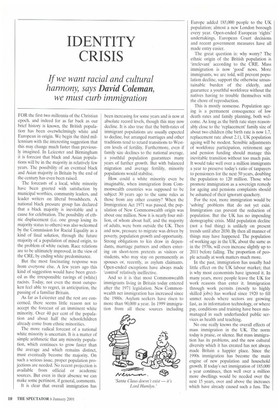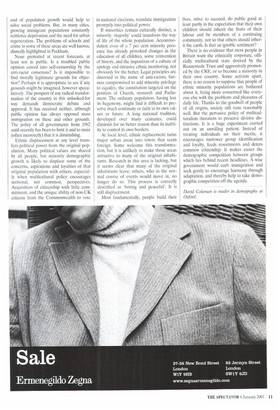IDENTITY CRISIS
If we want racial and cultural
harmony, says David Coleman,
we must curb immigration
FOR the first two millennia of the Christian epoch, and indeed for as far back as our brief history is known, the British population has been overwhelmingly white and European in origin. We begin the third millennium with the interesting suggestion that this may change much faster than previously imagined. In Leicester and Birmingham it is forecast that black and Asian populations will be in the majority in relatively few years. The possibility of an eventual black and Asian majority in Britain by the end of the century has even been raised.
The forecasts of a local, white minority have been greeted with satisfaction by municipal worthies, community leaders, and leader writers on liberal broadsheets. A national black pressure group has declared that a black majority is inevitable and a cause for celebration. The possibility of ethnic displacement (i.e. one group losing its majority status to others) was also welcomed by the Commission for Racial Equality as a kind of final solution, through the future majority of a population of mixed origin, to the problem of white racism. Race relations are to be ultimately improved, in the view of the CRE, by ending white predominance.
But the most fascinating response was from everyone else. A few years ago this kind of suggestion would have been greeted as the irresponsible ravings of (white) racists. Today, not even the most outspoken feel able to regret, in anticipation, the passing of a familiar Britain.
As far as Leicester and the rest are concerned, there seems little reason not to accept the forecast of an imminent white minority. Over 40 per cent of the population and about half the schoolchildren already come from ethnic minorities.
The more radical forecast of a national white minority is uncertain. It is a matter of simple arithmetic that any minority population, which continues to grow faster than the average and which remains distinct, must eventually become the majority. On such a serious issue, proper population projections are needed. No recent prOjection is available from official or academic sources. But even in their absence we can make some pertinent, if general, comments.
It is clear that overall immigration has been increasing for some years and is now at absolute record levels, though this may now decline. It is also true that the birth-rates of immigrant populations are usually expected to decline, but arranged marriages and other traditions tend to retard transitions to Western levels of fertility. Furthermore, even if family size declines to the national average, a youthful population guarantees many years of further growth. But with balanced migration and average fertility, minority populations would stabilise.
How could a white minority even be imaginable, when immigration from Commonwealth countries was supposed to be subject 30 years ago to the same rules as those from any other country? When the Immigration Act 1971 was passed, the population of New Commonwealth origin was about one million. Now it is nearly four million, of whom about half, and the majority of adults, were born outside the UK. Then and now, pressure to migrate was driven by poverty, population growth and opportunity. Strong obligations to kin draw in dependants, marriage partners and others entering on short-term pretexts as visitors or students, who may stay on permanently as spouses or, recently, as asylum claimants. Open-ended exceptions have always made 'control' relatively ineffective.
And so it is that most Commonwealth immigrants living in Britain today entered after the 1971 legislation. New Commonwealth net immigration has increased since the 1980s. Asylum seekers have risen to more than 90,000 a year. In 1999 immigration from all these sources including Europe added 185,000 people to the UK population; almost a new London borough every year. Open-ended European `rights' undertakings, European Court decisions and recent government measures have all made entry easier.
The great question is: why worry? The ethnic origin of the British population is 'irrelevant' according to the CRE. Mass immigration is now 'good' news. More immigrants, we are told, will prevent population decline, support the otherwise unsustainable burden of the elderly, and guarantee a youthful workforce without the natives having to trouble themselves with the chore of reproduction.
This is mostly nonsense. Population ageing is a permanent consequence of low death rates and family planning, both welcome. As long as the birth rate stays reasonably close to the 'replacement' family size of about two children (the birth rate is now 1.7, replacement rate about 2.1), UK population ageing will be modest. Sensible adjustments of workforce participation, retirement age and pension funding should manage this inevitable transition without too much pain. It would take well over a million immigrants a year to preserve today's ratio of taxpayers to pensioners for the next 50 years, doubling the population to 120 million. Those who promote immigration as a sovereign remedy for ageing and pensions complaints should be ashamed of their ignorant quackery.
For the rest, more immigration would be 'solving' problems that do not yet exist. Immigration can prevent the reduction of population. But the UK has no impending demographic crisis. Mild population decline (not a bad thing) is unlikely on present trends until after 2030. By then all manner of things may have happened. The population of working age in the UK, about the same as in the 1970s, will even increase slightly up to 2011 before falling. The proportion of people actually at work matters much more.
In the past, immigration has usually had little effect on the UK labour market; that is why most economists have ignored it. In many years, more people leave the UK for work reasons than enter it. Immigration through work permits (mostly to highly skilled jobs) has worked since 1920 to fill unmet needs where sectors are growing fast, as in information technology, or where pay, conditions and training have been mismanaged in such underfunded public services as health and teaching.
No one really knows the overall effects of mass immigration in the UK. The norm today is praise, or silence. But mass immigration has its problems, and the new cultural diversity which it has created has not always made Britain a happier place. Since the 1990s immigration has become the main engine of new population and household growth. If today's net immigration of 185,000 a year continues, then well over a million more dwellings would be needed over the next 15 years, over and above the increases which have already caused such a fuss. The end of population growth would help to solve social problems. But, in many cities, growing immigrant populations constantly reinforce deprivation and the need for urban regeneration. The problems of schools and crime in some of these areas are well known, dismally highlighted in Peckham.
None protested at recent forecasts, at least not in public. Is a troubled public opinion cowed into self-censorship by the anti-racist consensus? Is it impossible to find morally legitimate grounds for objection? Perhaps it is appropriate to see if any grounds might be imagined, however speculatively. The prospect of any radical transformation of the country in this unlooked-for way demands democratic debate and approval. It has received neither, although public opinion has always opposed mass immigration on these and other grounds. The policy of all governments from 1962 until recently has been to limit it and to insist (often incorrectly) that it is diminishing.
Ethnic displacement at any level transfers political power from the original population. Many political values are shared by all people, but minority demographic growth is likely to displace some of the concerns, aspirations and loyalties of that original population with others, especially when multicultural policy encourages sectional, not common, perspectives. Acquisition of citizenship with little commitment, and the unique ability of non-UK citizens from the Commonwealth to vote in national elections, translate immigration promptly into political power.
If minorities remain culturally distinct, a minority 'majority' could transform the way of life of the whole population. Accommodation even of a 7 per cent minority presence has already provoked changes in the education of all children, some reinvention of history, and the imposition of a culture of apology and intrusive ethnic monitoring, not obviously for the better. Legal principles arc distorted in the name of anti-racism, fairness compromised to add minority privilege to equality, the constitution targeted on the position of Church, monarch and Parliament. The ordinary population, having lost its hegemony, might find it difficult to preserve much continuity or faith in its own values or future. A long national tradition, developed over many centuries, could diminish for no better reason than its inability to control its own borders.
At local level, ethnic replacement turns major urban areas into towns that seem foreign. Some welcome this transformation, but it is unlikely to make those areas attractive to many of the original inhabitants. Research in this area is lacking, but it seems clear that many of the original inhabitants leave; others, who in the normal course of events would move in, no longer do so. This process is correctly described as 'boring and peaceful'. It is still displacement.
Most fundamentally, people build their lives, strive to succeed, do public good at least partly in the expectation that their own children should inherit the fruits of their labour and be members of a continuing community. not so that others should inherit the earth. Is that an ignoble sentiment?
There is no evidence that most people in Britain want the ethnically corporate, officially multicultural state desired by the Runnymede Trust and aggressively promoted by the CRE, or to become a minority in their own country. Some activists apart, there is no reason to suppose that people of ethnic minority populations are bothered about it, being more concerned like everyone else with the problems and pleasures of daily life. Thanks to the goodwill of people of all origins, society still runs reasonably well. But the pervasive policy of multiculturalism threatens to preserve divisive distinctions. It is a huge experiment carried out on an unwilling patient. Instead of treating individuals on their merits, it encourages narrower group identification and loyalty, feeds resentments and deters common citizenship. It makes easier the demographic competition between groups which lies behind recent headlines. A wise government would curb immigration and seek gently to encourage harmony through adaptation, and thereby help to take demographic competition off the agenda.
David Coleman is reader in demography at Oxford.



















































 Previous page
Previous page